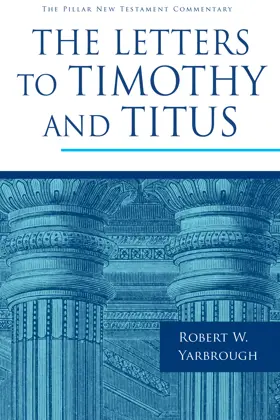

The Letters to Timothy and Titus
in Pillar New Testament Commentary
Pages
640
Publisher
Eerdmans
Published
8/28/2018
ISBN-13
9780802837332
The Pastoral Letters—1 Timothy, 2 Timothy, and Titus—have made an enduring contribution to understanding the role of pastors in the church. With a spirited devotion to the text, Robert Yarbrough helps unlock the meaning of these short but rich letters in this commentary.
In keeping with the character of Pillar New Testament Commentary volumes, The Letters to Timothy and Titus offers a straightforward reading of these texts. Their primary concerns—God, salvation, and the pastoral task—remain central to Yarbrough’s thorough and comprehensive exegesis. Engaging with the best scholarship and resources, Yarbrough shows how these letters are as relevant today as they were to the early Christians.
In keeping with the character of Pillar New Testament Commentary volumes, The Letters to Timothy and Titus offers a straightforward reading of these texts. Their primary concerns—God, salvation, and the pastoral task—remain central to Yarbrough’s thorough and comprehensive exegesis. Engaging with the best scholarship and resources, Yarbrough shows how these letters are as relevant today as they were to the early Christians.
Collections
This book appears in the following featured collections.
- Basic Library Booklist by Detroit Baptist Theological Seminary
- Recommended New Testament Commentaries for Evangelical Pastors by Thomas R. Schreiner
- TGC: Scholarly Commentaries by The Gospel Coalition
Reviews
Exegetically rigorous, theologically faithful, brimming with rich insights, and majoring on what’s important. He works from the Greek text but only cites it in footnotes. A top pick for both pastors and scholars.
[Full Review]
There are 1,978 footnotes in this commentary for those who are interested on such things. I told my wife this is the important type of study that goes on for the church. I have a feeling that this commentary will receive low ratings for a number of reasons, like traditional authorship and gender roles, of which I hope to see more of honestly. Those who have a love of novelty will probably not appreciate this volume, but it is truly refreshing. Very little speculation and focuses closely on what is actually said. Excels in word study, but never out of mind to the sentence and context at large. Focus on theology over the typical pros and cons of authorship issues that typically overwhelm a work on the three letters to Timothy and Titus. At about 600 pages, there was alot to chew on that was remarkably easy on the reader. With a couple of good intro commemtaries, I can't see myself looking for another except perhaps a biblical theological approach such as Kostenberger or definitely Beale's when it comes out.

